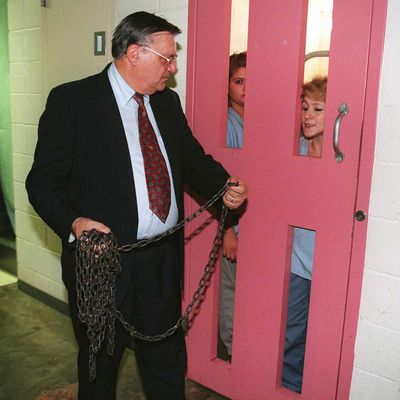
Progressives have long argued that Republicans use “law and order” as a racial dog whistle. A reverence for the letter of the law — and its impartial enforcement — was never actually a cornerstone of conservative politics, the left alleges. Rather, what truly matters to the right is the maintenance of “order”; which is to say, of social and racial hierarchies.
Thus, William F. Buckley — the leading intellectual light of modern conservatism and stalwart champion of “law and order” — could argue in 1957 that “the White community” of the South could justly deny black citizens their legal right to the ballot, so as to ensure that “the advanced race” would “prevail, politically.” And, decades later, Republicans could celebrate Kim Davis for denying same-sex couples their legal right to marriage licenses in defiance of a federal court order as a defense of traditional marriage — or praise the Bush administration’s myriad violations of Americans’ civil liberties and international law as necessary measures for protecting “our” freedom from the Muslim other.
But the indifference of (many) conservative proponents of “the rule of law” to the conventional definition of the phrase has never been more naked than during the Trump era. And last night in Arizona, Mike Pence gave his movement’s contempt for equality before the law some especially indecent exposure.
Speaking at a “tax policy” event in Tempe, the vice-president took a moment to welcome the criminally racist former sheriff of Arizona’s Maricopa County, Joe Arpaio, to the rally, praising him as a “tireless champion of strong borders and the rule of law,” and going on to say, “I’m honored to have you here.”
To say that Joe Arpaio is a “tireless champion” of “the rule of law” is to concede the left’s darkest interpretation of what conservatives mean by that term.
Arpaio was convicted of criminal contempt in 2016 for refusing to honor a court order. His office had made a regular practice of detaining its Latino constituents solely because they looked, to Arpaio’s (overwhelmingly white) deputies, like they weren’t legal U.S. residents. The judiciary said this was unconstitutional. Arpaio said (essentially) that he couldn’t care less — and then, so did the president of the United States, who directly undermined the rule of law (at least, under that term’s conventional definition) by handing Arpaio a pardon last August.
But criminally racist profiling was among the lesser offenses on Joe’s (figurative) rap sheet. During his decades-long tenure as sheriff, Arpaio presided over (what he himself called) a “concentration camp,” where low-level offenders and undocumented immigrants were subjected to daily cruel and unusual punishments. In Tent City, men and women who’d been convicted of — or, in most cases, merely charged with — crimes like drug use, shoplifting, and working with false documents were forced to live outdoors, year-round. In the summer, they sweated through 130-degree temperatures; in winter, they shivered through frigid nights, barred, by rule, from wearing any form of jacket or coat; when it rained, water poured through holes in the tents, soaking them in their beds. Arpaio forced his prisoners to march in pink underwear, work in chain gangs, shower in boiling-hot water, and eat rotten food (the sheriff boasted about this last point). His guards routinely strapped prisoners into restraint chairs and then tortured them with stun guns. Multiple prisoners died from such treatment. At least 157 of all Arpaio’s prisoners died before they got out. At least a quarter of those deaths were the result of suicide — for nearly half of them, authorities provided no official cause of death whatsoever.
And the sheriff’s reign of terror extended well beyond his prison’s gates. His officers subjected Latino Arizonans — citizens and noncitizens alike — to routine harassment and abuse. For Arpaio’s forces, “racial profiling” could involve slamming a pregnant Latina citizen into a car three times, stomach first, for refusing to follow arbitrary orders; while being “tough on crime” could mean forcing an innocent suspect’s dog back into a burning house, and then leaving the canine’s corpse to rot for days in 100-degree heat. When journalists or local politicians criticized these practices, Arpaio used the law as a weapon against them, raiding the homes of newspaper publishers and indicting office-holders on bogus felony charges.
Arpaio’s lawlessness may have reached a peak of unhinged sociopathy in 1999, when, in a bid to boost his reelection hopes, he oversaw a plot to blackmail a man into trying to assassinate him. That man spent four years in jail before a jury ruled that he had been a victim of entrapment.
But none of this – not a conviction for contempt of court, a long record of subjecting prisoners to unconstitutional cruelty, a habit of using law enforcement as a weapon for stifling dissent, or even his having framed a man for attempted murder — has disqualified Arpaio for “champion of the rule of law” status in the eyes of the Trumpist right. And why should it? After all, the sheriff was a tireless defender of order — specifically, the racial order that promised white Arizonans they were more American than their brown-skinned, Spanish-speaking neighbors. Arpaio once told The New Yorker that terrorizing the undocumented members of the latter group was one of his chief objectives, saying, “If they’re afraid to go to church, that’s good.”
Arpaio is a convicted criminal. And the myriad legal violations that he racked up during his time in the sheriff’s office cost Arizona taxpayers $140 million in fees for litigation and settlements. But he made “us” feel more comfortable by making “them” live in perpetual fear. And that’s more than enough to make Arpaio a champion of “the rule of law” to Mike Pence; and, perhaps, to make him Senate material to Republican primary voters in the Grand Canyon State.






























